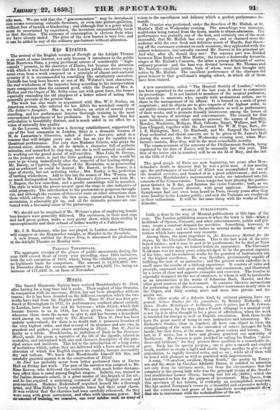AI17SICA_L PUBLICATIONS.
Little is done in the way of Musical publications at this time of the year. The London publishing season is when the town is full—when a multitude of Operas, Concerts, and other entertainments, public and pri- vate, create a constant demand for novelties. Something, however, is done at all times ; and we have before us several works worthy of at- tention which have appeared very recently.
Among these, the most important is, An Elementary ifethod for the Organ, by the Chevalier Neukomm. This is the last work of its cele- brated author; and it may be said to be posthumous, for he died at Paris only a few months ago, we believe before its appearance. The Chevalier Neukomm was for many years acknowledged to be the greatest organist of his time, and his numerous works for the grandest of instruments are of the highest excellence. He was, therefore, preeminently capable of fulfilling the task of an instructor ; and the present work embodies in a small space the results of a lifelong experience. It consists of rules and precepts, expressed with great simplicity and conciseness, and illustrated by a series of clear and apposite examples and exercises. The treatise is especially designed for the use of amateurs, to whom it will be invaluable as an introduction to the works of Sebastian Bach, Handel, and the other great masters of the instrument. It contains likewise instructions for performing on the Harmonium, a chamber-instrument nearly akin to the Organ, and daily coming more and more into private and do- mestic use.
Two other works of a didactic kind, by eminent pianists, have ap- peared: Octave Studies for the pianoforte, by Brinley Richards ; and Douze Etudes Milodigues et brillantes pour le piano, par F. B. Towson. We may observe, by the way, that a irench titlepage to a musical work is not (as it is often thought to be) a piece of affectation when the work is intended for foreign as well as English circulation. Both these books have the great merit of being at once instructive and interesting. Mr. Richards's Studies (four in number) all have one object in view, the strengthening of the wrist in the execution of octave passages for both hands; but they have, at the same time, great variety and beauty. The last, in F minor, has a force and gloomy grandeur not unworthy of Beethoven. Mr. Jewson is quite justified in calling his Studies "melo- dious and brilliant," for they possess these qualities in a remarkable de- gree. Each has its special purpose one to give a smooth and singing touch, another to create a light and elastic finger, another to give a clear articulation to rapidly iterated notes, and so on ; while all of them will be heard with pleasure as well as practised with improvement. A song, "0 swallow, swallow, flying South," the poetry by Tenny- son and the music by Caroline Adelaide Dance, is entitled to attention not only from its intrinsic merit, but from the circumstance that the composer is the young lady who was the principal victim of the fraudu- lent stockbroker Lemon Oliver, having lost her all, (50001.) which she had intrusted to him for the purpose of investment. Miss Dance, from this specimen of her talents, is evidently an accomplished musician. She has united Tennyson's verses to a beautiful and expressive melody ; and the correctness and grace of her pianoforte accompaniment show that she is conversant with the teehnicalities of the art.
. .






























 Previous page
Previous page